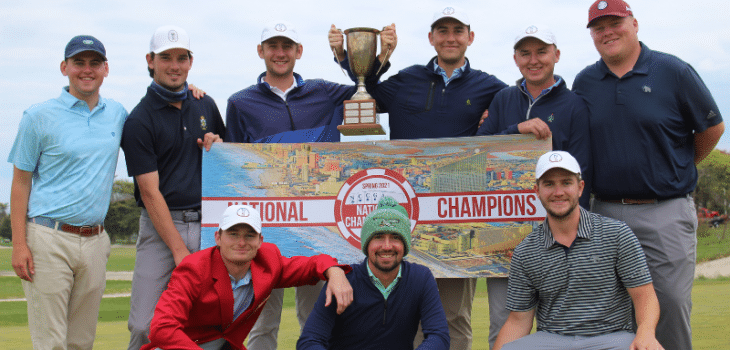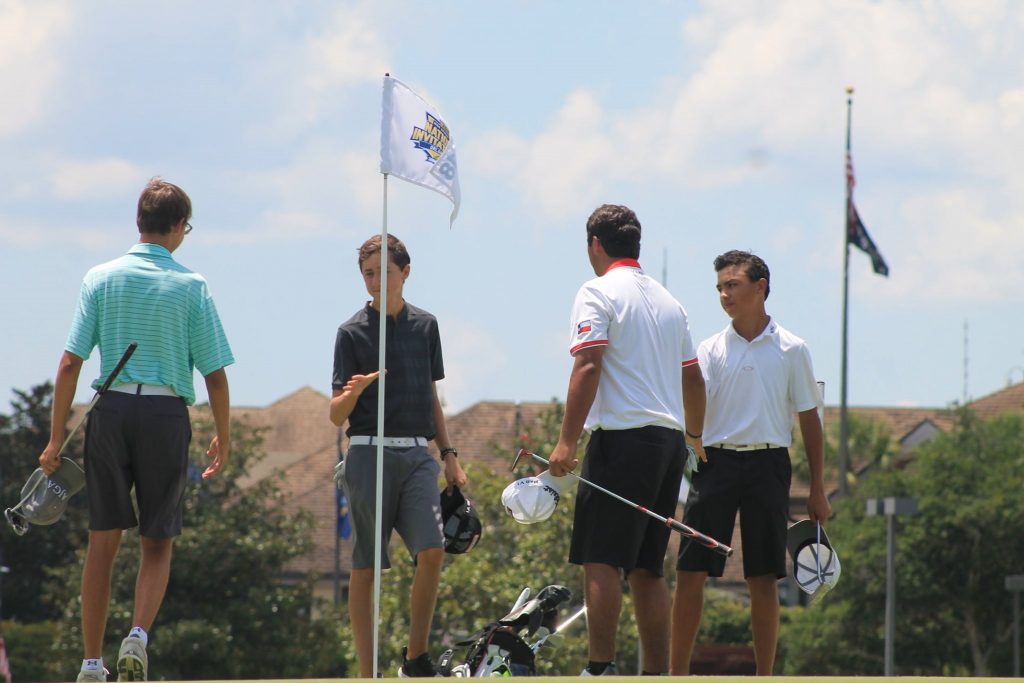
How good are college golfers and where can I play?
With a quick search on Google followed by a click-through Golfstat, you’ll know in a matter of minutes what the best college golfers in the country are shooting — spoiler alert: they go low — and you’ll be able to tell which teams are the best in the country.
As a junior golfer, you’re likely interested in college golf scores for a few reasons, one of which is because knowing what college players are shooting helps you determine where you might be able to play college golf.
Let’s start by defining the range of college golf scores… you need to know what players on the best and worst college golf teams in each division are shooting.

College golf scores from the best teams
The NCCGA has a great piece on their blog from a few years back illuminating what the best college teams and best players in the country are shooting. This article does a nice job of summing up just how good the best teams and players really are. The way I like to think about it is that the majority of players from the top 50 teams in the country are vying to become the next class of professional golfers. They are consistently shooting scores below par and winning tournaments. It’s the highest level of amateur golf in the country.
So understanding college golf scores at the top end is important, and fortunately, relatively easy to do. We can see which teams are qualifying for the DI, DII, and DIII NCAA regional and national championships, who is winning, and what kinds of scores they are shooting at those events. We can also look at season-long scoring averages. But the lower end… that’s a lot harder.
College golf scores from the weakest teams
I struggle with calling any team “weak” because there are a variety of reasons why a team might not produce the lowest scores, but you get the gist of what I’m striving for here… which varsity teams are producing the highest college golf scores? And what are those scores?
Knowing this allows you to understand whether it’s at all possible for you to play varsity college golf. Often, I hear this question in the form of, “what are the teams with the highest scoring averages that can still offer scholarships?” Or, “which of the top academic schools shoot the highest scores?”
Between digging around on Golfstat and the American College Golf Guide, I’ve put together the list below to give you a sense of the range of scores from the bottom 3-5 teams in each division:
Men:
DI: 74.6 – 88.2
DII: 75.7 – 87.2
DIII: 76.9 – 118.1
Women:
DI: 79.6 – 100.4
DII: 79.5 – 126.0
DIII: 80.0 – 135.2
Take all this with a grain of salt. Comparing high school golf scores to college golf scores isn’t an apples-to-apples comparison. But I hope this gives you a sense of what’s possible.

College Golf Scores vs. High School Golf Scores
Several factors make junior golfers more or less likely to see their scores go up or down when they get to college. Here are a few of the factors:
- Less time to practice in college (you are constantly competing, leaving little time for meaningful practice)
- Academic commitments
- Focus on future career / internships take priority over summer golf
- Weather
- Access to good coaching
- Goals (motivation vs. burnout)
So while it’s a helpful first step to know what college golfers are shooting in college, there’s a lot more that goes into recruiting that scores. And just because you can see what college players are shooting, don’t assume that that’s what they were shooting as a junior… don’t assume that those are the scores/scoring averages that got them recruited.
Understanding where you can play college golf
The best way to determine which college golf programs are a good fit for your golf ability is to compare your junior golf ranking and scores to the junior ranking and scores that college players shot when they were juniors. Essentially, how good were those college players at the time they were getting recruited? That’s what you really need to know if you’re trying to determine where you can play golf in college.
The Junior Golf Scoreboard makes this data available for each graduating high school class. You can see where junior players from the last four years have been recruited, and you can view each player’s junior golf ranking in their class and tournament scoring differential when they signed their National Letter of Intent.
To make it easier to view this data and learn more about each school, I’ve put together a free search tool: The College Golf School & Scholarship Finder. It’s a great way to learn about all of the schools that offer NCAA varsity golf and identify which schools are a good fit for you based on your golf and academics.

Getting recruited is about more than just scores
As you can see from the data, there’s a lot of overlap between the level of scores that DI, DII, and DIII golfers are shooting. Many great golfers are competing at the DIII level who had the ability to be recruited to a DI team.
At the end of the day, it’s about finding a school that offers the best fit overall. And that’s what coaches are looking for, too. They want kids excited about their team, want to keep working hard throughout college and be great teammates. It’s important to keep that in mind as you are communicating with coaches throughout the recruiting process. The qualitative factors can make all the difference!
More about Claire Sheldon Richardson, the founder of PSACC (Prospective Student-Athlete College Counseling)
Claire founded PSACC after spending three years as the Assistant Women’s Golf Coach at Harvard University. During her coaching career at Harvard, she assisted the Director of Golf in the recruiting process for both the men’s and women’s golf teams. She has seen first-hand what it takes to succeed in the recruiting process and as a Division I student-athlete. She is a former 4-year varsity golfer at Harvard, serving as captain her senior year. She set records for the lowest score in Harvard Women’s Golf history and still holds the record for most tournament wins. She also helped the golf team win 21 tournaments during her four years.
**You can contact Claire at http://www.psacollegecounseling.com or via email claire@psacollegecounseling.com.